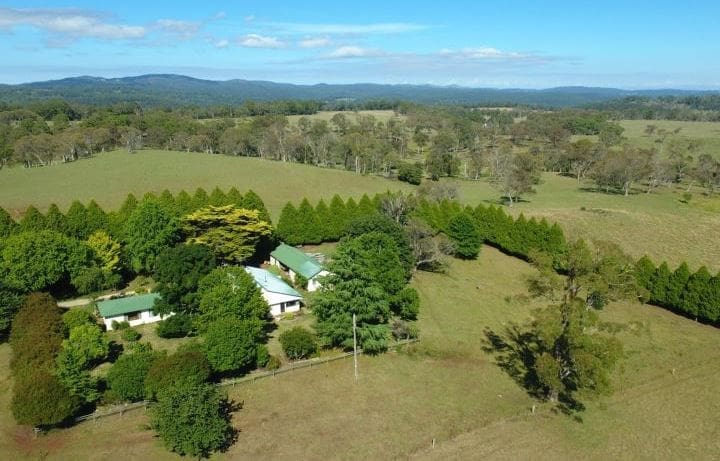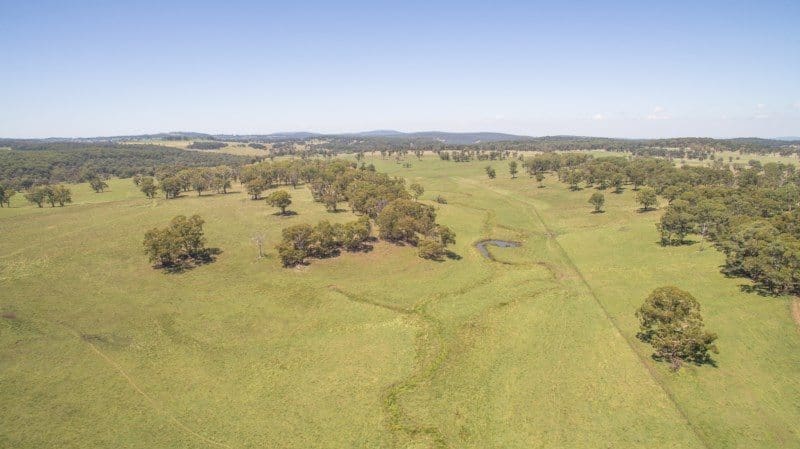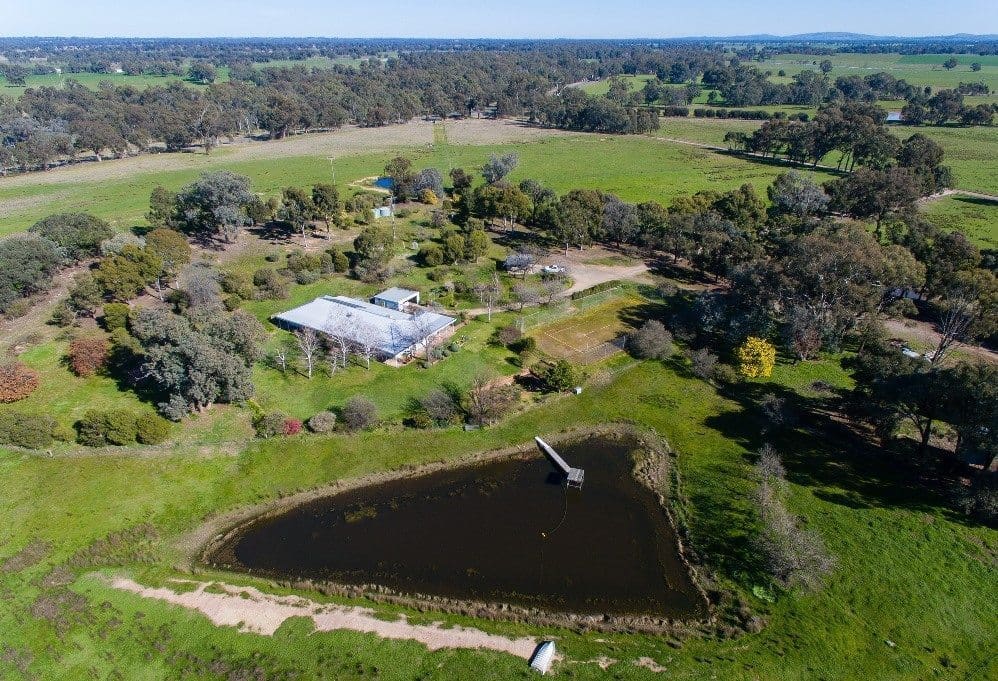
Large-scale Ebor (northern NSW) aggregation Glen Alvie was bought for a reported $17.5 million in June by Western Australia-based Stone Axe Pastoral Co, for Wagyu production.
THE New England region in northern NSW is one of the hot-spot locations for land investment by Australia’s new or expanding Wagyu breeders.
This week’s property review continues our two-part series looking at the mini property boom being fueled by interest in Wagyu beef (click here to view last week’s first installment).
Rawdon Briggs, the national director transaction services rural and agribusiness for Brisbane-based Colliers International, says operators with purebred or Fullblood Wagyu cattle looking to expand can often outbid any conventional operation at present by about 10 to 20 percent.
“Purebred or Fullblood Wagyu operations are just making more dollars in these market participants’ minds. It is setting a different property market value,” he said.
“For the most part, there are significant premiums in the Wagyu market. That’s certainly the trend we are seeing. Further illustrating this will be some forthcoming transactions under contract, which will settle by the end of this year,” Mr Briggs said.
However, experienced New South Wales Wagyu breeder Peter Bishop disagrees.
“A single enterprise buyer seeking expansion would need to be cautious, especially paying 15 to 20 percent more for a property, even though Wagyu F1 feeder steers are attracting around $5/kilo compared to Angus steers (going to feedlot) for around $3/kilo.”
Mr Bishop, whose family has been producing stud and commercial cattle in the Hunter Valley region for the past 100 years, explained there is no certainty that Wagyu premiums will stay as high as they currently are.
“Producers need to pay attention to the genetics they secure, simply buying any Wagyu bull and joining it to your females simply won’t cut it any more. Lotfeeders are becoming more discerning when it comes to buying Wagyu feeders.”
Mr Bishop said investment from new players was a factor driving today’s cattle property market in his region.
“There are plenty of domestic investors who have amassed a fair bit of capital over the last 10 to 15 years, in whatever businesses they have been involved in, who are now looking to park their money somewhere safe, like land,” he said.
Mr Briggs is also seeing domestic and overseas investors expressing specific interest in Australian Wagyu beef operations.
“Existing vendors with purebred or Fullblood Wagyu breeding herds, who have the genetics and carcase performance data to back it, are exceptionally attractive to a number of buyers today,” he said.
“With that said, we have also noted big improvement in carcase performance in some F1 Wagyu x Angus herds in NSW compared to just three years ago. Those F1-producing herds are absolutely knocking on the door,” he said.
Mr Briggs said the most sought-after country for Wagyu operations tended to be higher rainfall and tick-free areas, in a band stretching from the Hunter region in New South Wales, north to the Central Queensland’s buffel grass country.
“The target is productive and reasonably safe properties that average between 22 and 28 inches of rain a year, with improved pastures including buffel. They are preferably close to feedlots and grain supply – somewhere in NSW’s Upper Hunter and New England, or in southern Queensland.”
Northern NSW hot-spot
Andrew Starr, the principal at Ray White Rural Guyra/Armidale, has sold a number of properties in recent times to Wagyu breeders chasing breeding and weight-gain country.
“The New England region of northern NSW has high rainfall with good reliability. Producers who sow improved pastures and fertilise them well can maximise the kilograms of beef produced a hectare. When you have a high dollar, high-end product, every kilo counts. A Fullblood Wagyu selling for $6/kg liveweight compared to $3.30/kg for an average British-bred animal is a big premium,” he said.
Mr Starr said Wagyu operators were looking for specific country in his region.
“They are particularly seeking elevated country above 1000m of elevation, over 36 inches of average rainfall, basalt soils and country that is more than 80 percent arable to really drive kilograms of beef production a hectare.”
Several years ago, a substantial Wagyu operator from Queensland invested in two blue ribbon properties in the New England. Wally Rea from the Overflow at Marlborough in Central Queensland purchased the 945ha Stonehenge Station for around $7.4m or $7830/ha and 550ha Blairmore, near Glen Innes, for around $4.3m or $7818/ha.
Mr Starr said Mr Rea was specifically looking at higher-rainfall country.
“He has purchased some of the region’s very best backgrounding or weight gain country. He is trying to maximise the kilos on his genetically superior animals.”
In April this year, Mr Rea paid a record $5.6m, or $9950/ha, for the small, but highly productive 563ha Elderbury, near Guyra, midway between Armidale and Glen Innes. Elderbury was fully pasture improved and boasted a 23-year annual fertiliser history and was running 800 steers and yielding at a high level of annual beef weight-gain production.

Queensland Wagyu pioneer Wally Rea paid a record $5.6m, or $9950/ha in April, for the small but highly productive 563ha Elderbury, near Guyra, midway between Armidale and Glen Innes
Just two months later, Mr Starr sold the large-scale Ebor aggregation Glen Alvie for a reported $17.5m to the Western Australia-based Stone Axe Pastoral Company, which was chasing high performance grass country, in a high rainfall and high elevation area in its pursuit to develop the world’s largest vertically integrated Fullblood Wagyu enterprise.
New entrant
A new player entering the Wagyu industry in September was wealthy Australian-based businessman Robert McVicker, the founder of the global firm Morris Corporation that provides catering and logistics for military, mining and other large-scale work community customers worldwide.
His purchase of Victoria’s respected Goshu Fullblood Wagyu herd represented one of the biggest investments in Fullblood Wagyu since the sale of the Kuro Kin herd, Gina Rinehart’s investments in the Green Hills herd and a large line of Blackmore breeders last year.
Mr McVicker has subsequently shifted the herd to a large southern Queensland grazing property he bought five years ago.
At 1600ha, Shamrockvale, an hour’s drive south of Brisbane near the NSW border, is one of the largest grazing properties in the Beaudesert district. The holding has extensive irrigation along the Albert River frontage and can comfortably carry 1200 Adult Equivalents.
With room and scale, the Goshu breeding herd will be reportedly expanded at Shamrockvale over the coming years. Plans are to produce both Fullblood bulls for sale to other breeders, as well as commercial feeder steers and heifers for longfed feedlot operations.
Another recent property purchase for Wagyu operations last month was made by prominent Victorian Wagyu beef producer David Blackmore, who paid $4.95m for the noted Benalla district holding East Mount Ada, in the state’s north-east.
Blackmore Wagyu is an award-winning and internationally-recognised producer whose highly marbled Fullblood beef is served in top restaurants in 20 countries including Australia, New York and China.

East Mt Ada, bought by Victorian Wagyu breeder David Blackmore
Mr Blackmore had been searching for a new property since 2015, after abandoning a two-year zoning and land-use battle with the Murrindindi Shire Council to keep farming his herd on his 150ha property Alexandra, in the upper Goulburn Valley, north of Melbourne.
At the time, Mr Blackmore said he was looking for fertile, visually appealing property that was well-watered with good rainfall (more than 750mm) to keep the property green throughout the year.
The 609ha East Mount Ada appears to have ticked all the boxes. Located in the heart of the Broken River Valley, it has secure water, good rainfall and is estimated to carry 375 cows and calves.
